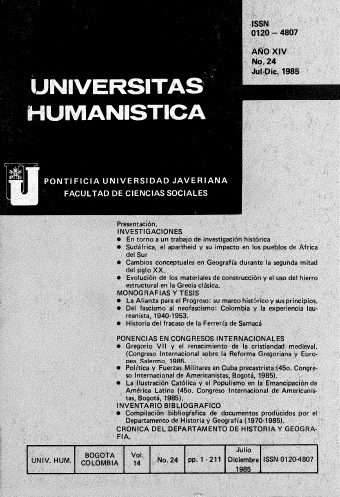Abstract
Analiza a partir de la década del 50, como la geografía al igual que todas las Ciencias Humanas, han sufrido hondas transformaciones en sus objetivos y métodos. En nuestra ciencia ello da lugar a la aparición de "una nueva geografía", llamada cuantitativa, que intenta ser una disciplina verdaderamente científica, con base a modelos teóricos, a las matemáticas y a la estadística. En la década del 70 aparece otra "nueva geografía" llamada radical que critica las concepciones cuantitativas y frente a la realidad social en el sentido de que pretende un cambio que llegue a la raíz de los problemas. Estos geógrafos coinciden con la otra gran rama del movimiento radical, la llamada geografía humanística que se basa más directamente en el existencialismo y en la fenomenología.

This journal provides immediate open access to its content on the principle that making research freely available to the public, encourages greater global exchange of knowledge.
The journal Universitas Humanística is registered under a Creative Commons Attribution 4.0 International Public License. Thus, this work may be reproduced, distributed, and publicly shared in digital format, as long as the names of the authors and Pontificia Universidad Javeriana are acknowledged. Others are allowed to quote, adapt, transform, auto-archive, republish, and create based on this material, for any purpose (even commercial ones), provided the authorship is duly acknowledged, a link to the original work is provided, and it is specified if changes have been made. Pontificia Universidad Javeriana does not hold the rights of published works and the authors are solely responsible for the contents of their works; they keep the moral, intellectual, privacy, and publicity rights.
Approving the intervention of the work (review, copy-editing, translation, layout) and the following outreach, are granted through an use license and not through an assignment of rights. This means the journal and Pontificia Universidad Javeriana cannot be held responsible for any ethical malpractice by the authors. As a consequence of the protection granted by the use license, the journal is not required to publish recantations or modify information already published, unless the errata stems from the editorial management process. Publishing contents in this journal does not generate royalties for contributors.


